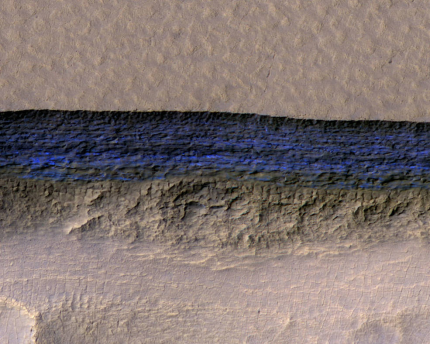Mars ice would be available to astronauts

An enhanced-color view of underground ice exposed at the slope.
Image: NASA.
Scientists have uncovered eight Mars sites with ice deposits beneath the surface. They made the finding using images from NASA's Mars Reconnaissance Orbiter, a spacecraft in orbit around the planet.
This is the latest turn in long-running research aimed at determining if Mars has water that could be used by humans. In 2015, researchers announced that under certain conditions water flows on Mars. They had observed “recurring slope lineae,” basically, dark lines on the surface. But in 2017, another group of researchers said the finding was wrong. And in December, researchers at Oxford University’s Department of Earth Sciences speculated that what was once water is now locked in Martian rocks.
This latest finding involves ice that was deposited as snow long ago, according to NASA. “The deposits are exposed in cross section as relatively pure water ice, capped by a layer one to two yards (or meters) thick of ice-cemented rock and dust,” a space agency news release explains. The ice is exposed on steep, eroding slopes. Astronauts could "essentially just go there with a bucket and a shovel and get all the water they need," predicted Shane Byrne, associate professor at the University of Arizona Lunar and Planetary Laboratory and a researcher involved in the study.
Instruments on board the spacecraft helped scientists determine that they were seeing water ice, some of it more than 100 meters thick.
Researchers previously had reported on underground water-ice sheets in the middle latitudes of Mars. But this study indicates that “a layer rich in water ice begins within just one or two yards of the surface in some areas,” according to NASA.
The research, "Exposed subsurface ice sheets in the Martian mid-latitudes," by Colin M. Dundas, et al, was published in Science magazine Jan. 12.
Related:
Research: Mars water absorbed like sponge
Follow StudyHall.Rocks on Twitter or like us on Facebook and tell us what you think.

